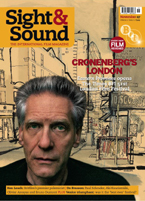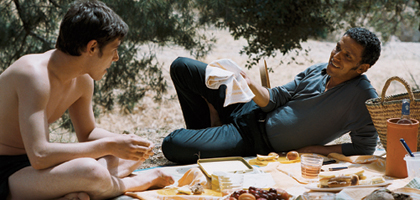Primary navigation


André Téchiné's new film explores the impact of the Aids epidemic on a group of Parisians. Has distance lent a muted optimism, asks Ginette Vincendeau
With its young provincials newly arrived in Paris, troubled relationships and homosexual theme, The Witnesses has all the hallmarks of an André Téchiné film. Except that this time homosexuality takes centre stage rather than being relegated to a subplot as in J'embrasse pas (1991), Les Roseaux sauvages (1994) or Alice et Martin (1998). Even more unusually, the film looks back to the onset of the Aids epidemic in the early 1980s.
Téchiné has said "I can never accept that a character be reduced to his or her sexual orientation" and "I don't think [The Witnesses] plays the card of sociological survey." Yet his characters here are largely defined by their social status and sexual practice. Sarah (Emmanuelle Béart) writes children's books and lives with her husband Mehdi (Sami Bouajila) and their newborn baby. We quickly learn that she is not, in her own words, "made for being a mother" whereas Mehdi is tender and caring towards the child. She is from a well-off background, he is not; she is Jewish, he is an Arab. Meanwhile their friend Adrien (Michel Blanc), a consultant at a Paris hospital, is seen cruising and picking up a young man, Manu (Johan Libéreau). Adrien is smitten but Manu refuses to have sex and they embark on a platonic relationship. The middle-aged Adrien is wealthy and cultured; Manu, an apprentice cook, has the energy of youth but lacks sophistication.
When the two couples spend a weekend together by the Mediterranean, Manu almost drowns and Mehdi rescues him. The two men begin a torrid sexual relationship, meeting in secret at the holiday camp outside Paris where Manu lives and works. So far so conventional, but Téchiné undermines many of our expectations. When the affair is finally revealed, it doesn't give rise to marital jealousy as Sarah and Mehdi have an apparently solid 'open' marriage. But Adrien's discovery of the affair - which upsets him much more than it does Sarah - is also his discovery that Manu is stricken with the 'new' disease of Aids.
The witnesses of the film's title are not only Adrien, Sarah and Mehdi but also Julie, Manu's sister, with whom he initially shares a cheap hotel bedroom. And much of the film's originality lies in the different ways these witnesses translate their experience of Manu's trauma. Sarah writes a book, with difficulty at first, and part of the film is narrated through her voiceover. Adrien throws himself into medical research and launches an Aids charity (modelled on a venture founded by Michel Foucault's partner after the philosopher died of the disease in 1984, the year in which the film takes place). Julie expresses her feelings through her singing - along with Adrien, we watch her perform a poignant Mozart aria after Manu's death.
If the notion of characters changed by the death of a close friend or relative is hardly original, Téchiné's mix of poetry and documentary is innovative. Particularly subtle is the way the equation of relationships with the elements - the water of drowning and rebirth, the air of love and elation - is woven into the quotidian detail of blood tests, lectures and leaflets. Téchiné manages to avoid pathos and melodrama in his treatment of illness, with none of the protracted hospital scenes found in Philadelphia, while Manu's funeral is a model of concision.
Yet The Witnesses does not avoid cliché completely. From the start we guess that what Sarah is telling us in voiceover is what we see her writing on her 'period' typewriter and that her writer's block will be overcome. And while the male cruising scenes are swift and to the point, the police subplot involving prostitute Sandra is clunky. Apart from when Adrien asks her to distribute Aids leaflets to fellow prostitutes, Sandra is only granted a narratively pointless scene, dancing to the overused 1980s hit 'Marcia Baila'. It is also typical of French auteur cinema that the lead female characters are middle-class and artistic while the working-class woman is a garish prostitute.
In his book on homosexuality in French cinema, Alain Brassart credits Téchiné with the ability to create strong and sensitive female characters, especially as embodied by Catherine Deneuve (Hôtel des Amériques, 1981; Le Lieu du crime, 1986; Ma saison préférée, 1993; Les Voleurs, 1996). Yet in The Witnesses the stark contrast between non-maternal women and gentle, loving men is clumsy. Somewhat against verisimilitude, Mehdi combines being an ace policeman with looking after his baby while Adrien, a top consultant, devotes himself to caring for Manu. But the wan Julie cannot even envisage mixing a career and a relationship and Emmanuelle Béart, already at a disadvantage in acting terms against the formidable Michel Blanc and Sami Bouajila (the Félix of the gay cult film Drôle de Félix and co-star of Days of Glory), ends up playing the most unsympathetic character - rich bitch and bad mother too! A pointed scene shows her typing with earplugs on, oblivious to the cries of her baby.
The Witnesses is not the first French film about Aids, as Téchiné well knows - his casting of Xavier Beauvois in a brief scene as Sarah's editor and lover is a nod to Beauvois' N'oublie pas que tu vas mourir (1995), about a young man who discovers he is HIV positive. But while the latter film and Les Nuits fauves (1992), Cyril Collard's iconic autobiographical study of a young HIV-positive bisexual played by the director himself, who died of Aids soon after its release, were very much of their time, The Witnesses is both a reconstruction with historical props (the typewriter, a few period cars, no mobile phones) and a film of today, with its well-integrated beur police inspector more typical of the 2000s than the 1980s.
As his first film explicitly centred on male homosexuality, The Witnesses marks a watershed in Téchiné's career. A direct heir to the New Wave (he was born in 1943 and his first film came out in 1970), Téchiné began directing at a time when homosexuality was still a taboo subject, despite the fact that it was an open secret that film-makers such as Marcel Carné or Jacques Demy were gay. Téchiné's early films show the self-censorship most gay film-makers felt obliged to practise, but gradually his work became more explicit, with Les Roseaux sauvages acting as a kind of 'coming out' film.
The Witnesses exhibits a subtle depiction of psychology that is clearly a mark of artistic maturity. And in contrast to the raw, tragic tone of Les Nuits fauves or N'oublie pas que tu vas mourir, made at a time when an HIV-positive diagnosis was likely to be a death sentence, the film is cautiously optimistic. The ending takes us to the luminous Mediterranean coast and a reconstituted family in which heterosexuals and homosexuals happily coexist (whereas Adrien had previously told Sarah that "heteros and fags should not be friends"). Here the baby, on its first birthday, is finally given a name. It is, of course, a boy.